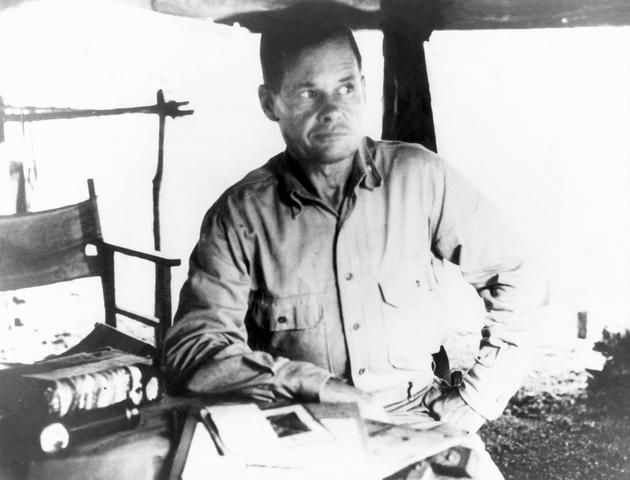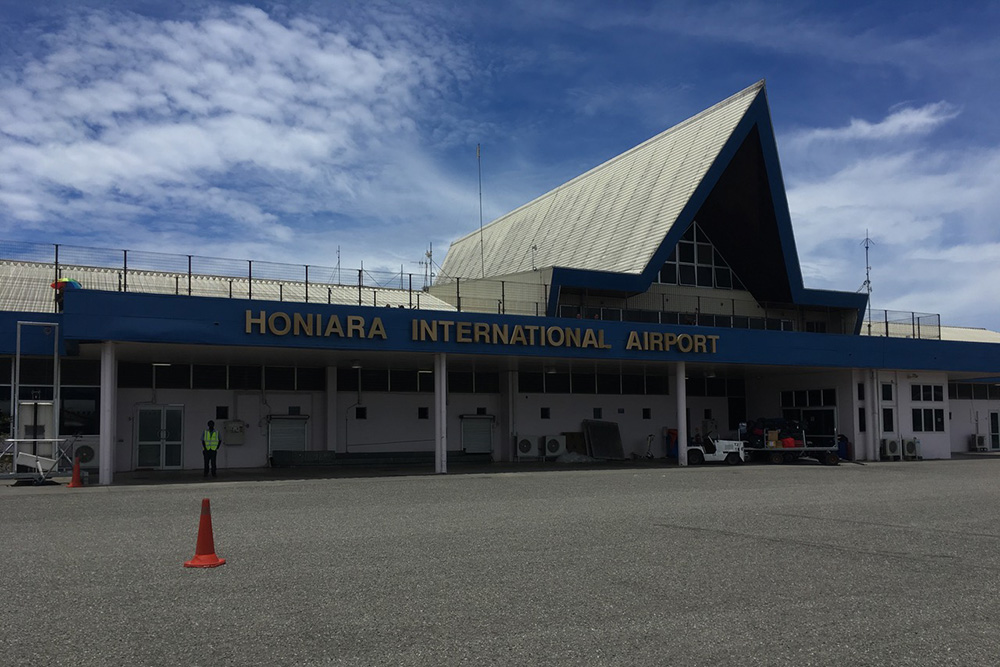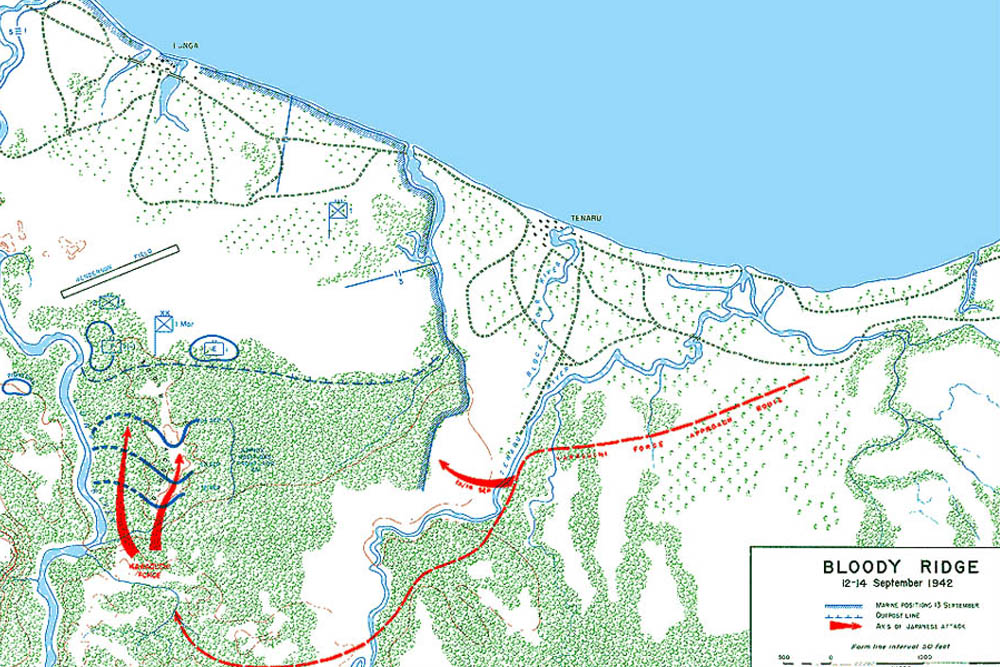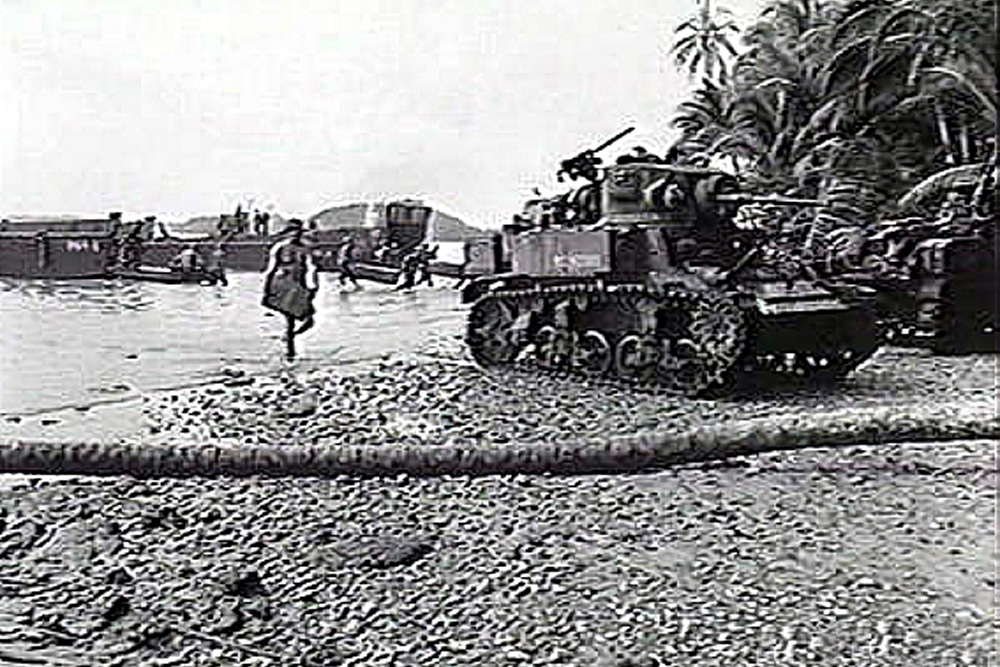Puller, Lewis Burwell "Chesty"
- Date of birth:
- June 26th, 1898 (West Point-King William County/Virginia, United States)
- Date of death:
- October 11th, 1971 (Saluda/Virginia, United States)
- Service number:
- O-3158
- Nationality:
- American
Biography
Lieutenant General Lewis Burwell "Chesty" Puller was born on 26th June 1898 in West Point, Virginia as son of Matthew and Martha Puller. When "Chesty" was only 10 years old his father, a grocer, died. He lived his life to become a military. When the war with Mexico broke out he wanted to join the Army, but was too young and his mother did not want to agree. In 1917 he joined he Virginia Military School, but left this to join in the first World War. He enlisted with the United States Marine Corps as a private and attended Boot Camp at Parris Island, South Caroline. He graduated an was send to the NCO school and Officer Training School at Quantico, Virginia. He graduated from the OTC on 16th June 1919. He was appointed Second Lieutenant in Reserves, but was inactivated soon after with the rank of Corporal.
He served as Lieutenant with the Gendarmerie d’Haiti and participated in the fightings against the Caco Rebels. In 1922 he was appointed Adjutant to General Alexander Vandegrift. Lewis Puller returned to the States on 6th March 1924 and was recommissioned as Second Lieutenant (Servicenumber O3158). Then followed assignments at the Marine Barracks in Norfolk, The Basic School in Quantico and 10th Marine Artillery Regiment in Quantico. In July 1926 he was assigned to the Marine barracks at Peral Harbor and in 1928 in san Diego, California.
In December 1928 he joined the Nicaraguan National Guard and earned his first Navy Cross for actions between 16th Febraury and 19th August 1930, leading five engagements against bandit forces. He returned to the States again in July 1931 and attended the Company Officers course at Fort Benning, Georgia. Between 20th September and 1st October 1932 he returned to Nicaragua and there earned his second Navy Cross.
Next "Chesty" Puller was assigned to the Marine detachment with the American Legislation in Bejing, China and there commanded a unit of Chinese Marines. This was followd by the assignment aboard the U.S.S. Augusta (CA-31) in the Asiatic Fleet. In June 1936 he returned to the States and was appointed to Instructor at the Basic School in Philidelphia. In May 1939 Puller returned to the U.S.S. Augusta to serve as its commander of the Marine detachment and went back to China to disembark in Shanghai in May 1940. Here he served as Executive Officer with the 2nd Battalion, 4th Marines, later becoming its Commander.
Just prior to the outbreak of the Second World War, then Major Puller returned to the States on 28th August 1941. He then was appinted Commanding Officer of 1st Battalion, 7th Marines, 1st Marine Division. The unit was stationed at New River, which was a new Marine Amphibious base, later becoming MCB Camp Lejeune, North Carolina. The unit was to become part of the 3rd Marine Brigade and arrived to defend Samoa on 8th May 1942. They left Samoa on 4th September to rejoine the 1st Marine Divison on Guadalcanal on 18th September.
On Guadalcanal, Puller led his unit in fightings along the Matanikau For his actions here he received his Bornze Star. He also earned his third Navy Cross during the Battle for Henderson Field where his unit was the only to defend the airfield against a Japanese regiment in the fightings during the night of 24th/25th October. On Guadalcanal, Puller also was wounded by a sniper and shrapnel, earning him the Purple Heart.
Puller then becam Executive Officer of the 7th Marine Regiment. In this capcitiy he earned his fourth Navy Cross serving at Cape Gloucester between 26th December 1943 and 19th January 1944 leading attacks against heavily fortified Japanese defensive positions.
On 1st February 1944, Puller was promoted to Colonel and by the end of February was appinted Commanding Officer of 1st Marine Regiment. He led the regiment in the Battle for Peleliu in September and October 1944. Here he earned his first Legion of Merit.
In November 1944, lewis Puller returned to the United States and was appointed Executinve Officer with the Infantry Training Regiment at Camp Lejeune. Two weeks later he bacema its Commanding Officer.
When the war was over, Puller was appointed Director of the 8th Reserve District, New Orleans, Louisiana and later commanded the Marine Barracks at Pearl Harbor. With the outbreak of the Korean war, Puller again commanded the 1st Marine Regiment and landed in Inchon on 15th September 1950. Here he earned a Silver Star. For his leadership between 15th September and 2nd November he earned a second Legion of Merit and was awarded the distinguished Service Cross for actions between 29th November and 5th December together with his fifth Navy Cross during the Battle of Chosin Reservoir. Puller was promoted to Brigadier General in January 1951 and appointed Assistant Division Commander, 1st Marine Division. When his superios, Major General O.P. Smith was transferred to command the X.Corps, Puller was appinted Commanding Officer of the 1st Marine Division. He returned to the United States on 20th May 1951. Later he was promoted to Major General and Lieutenant General and retired for health reasons on 1st November 1955.
Puller and his wife Virginia McCandlish Puller, spent their retirement life in Virginia. His house became a well known visiting place for U.S. Marine military. When the Vietnam was broke out, Puller tried to be re-enlisted, but was rejected for his age.
On 11th October 1971, Lewis Puller passed away in Saluda, Virginia at the age of 73. He was buried at the Christchurch Cemetery. His wife died in 2006 and was buried beside her husband.
Do you have more information about this person? Inform us!
- Rank:
- First Lieutenant (Lieutenant)
- Unit:
- Guardia Nacional de Nicaragua
- Awarded on:
- 1930
- Rank:
- First Lieutenant (Lieutenant)
- Unit:
- Guardia Nacional de Nicaragua
- Awarded on:
- 1932
Second Navy Cross received as a first gold star to be worn on the ribbon of the first Navy Cross.
- Period:
- Second World War (1939-1945)
- Unit:
- 2nd Battalion, 4th Marine Regiment, 2nd Marine Brigade, U.S. Marine Corps
- Awarded on:
- 1940
- Period:
- Second World War (1939-1945)
- Rank:
- Major
- Unit:
- 1st Battalion, 7th Marine Regiment, 1st Marine Division "The Old Breed", U.S. Marine Corps
- Awarded on:
- 1942
Received with "V" for valor.
- Period:
- Second World War (1939-1945)
- Rank:
- Lieutenant Colonel
- Unit:
- 1st Battalion, 7th Marine Regiment, 1st Marine Division "The Old Breed", U.S. Marine Corps
- Awarded on:
- 1942
"For extraordinary heroism as Commanding Officer of the First Battalion, Seventh Marines, First Marine Division, during the action against enemy Japanese forces on Guadalcanal, Solomon Islands, on the night of 24 to 25 October 1942. While Lieutenant Colonel Puller’s battalion was holding a mile-long front in a heavy downpour of rain, a Japanese force, superior in number, launched a vigorous assault against that position of the line which passed through a dense jungle. Courageously withstanding the enemy’s desperate and determined attacks, Lieutenant Colonel Puller not only held his battalion to its position until reinforcements arrived three hours later, but also effectively commanded the augmented force until late in the afternoon of the next day. By his tireless devotion to duty and cool judgment under fire, he prevented a hostile penetration of our lines and was largely responsible for the successful defense of the sector assigned to his troops."
Third Navy Cross received as a second gold star to be worn on the ribbon of the first Navy Cross.
- Period:
- Second World War (1939-1945)
- Rank:
- Lieutenant Colonel
- Unit:
- 1st Battalion, 7th Marine Regiment, 1st Marine Division "The Old Breed", U.S. Marine Corps
- Awarded on:
- 1942
- Period:
- Second World War (1939-1945)
- Rank:
- Lieutenant Colonel
- Unit:
- 7th Marine Regiment, 1st Marine Division "The Old Breed", U.S. Marine Corps
- Awarded on:
- 1944
"For extraordinary heroism as Executive Officer of the Seventh Marines, First Marine Division, serving with the Sixth United States Army, in combat against enemy Japanese forces at Cape Gloucester, New Britain, from 26 December 1943 to 19 January 1944. Assigned temporary command of the Third Battalion, Seventh Marines, from 4 to 9 January, Lieutenant Colonel Puller quickly reorganized and advanced his unit, effecting the seizure of the objective without delay. Assuming additional duty in command of the Third Battalion, Fifth Marines, from 7 to 8 January, after the commanding officer and executive officer had been wounded, Lieutenant Colonel Puller unhesitatingly exposed himself to rifle, machine-gun and mortar fire from strongly entrenched Japanese positions to move from company to company in his front lines, reorganizing and maintaining a critical position along a fire-swept ridge. His forceful leadership and gallant fighting spirit under the most hazardous conditions were contributing factors in the defeat of the enemy during this campaign and in keeping with the highest traditions of the United States Naval Service."
Fourth Navy Cross received as a third golden star for on the ribbon of his first Navy Cross.
- Period:
- Second World War (1939-1945)
- Rank:
- Colonel
- Unit:
- 1st Marine Regiment, 1st Marine Division "The Old Breed", U.S. Marine Corps
- Awarded on:
- 1944
Received with "V" for valor.
- Period:
- Korean War (1950-1953)
- Rank:
- Colonel
- Unit:
- 1st Marine Regiment, 1st Marine Division "The Old Breed", U.S. Marine Corps
- Awarded on:
- October 27th, 1950
- Period:
- Korean War (1950-1953)
- Rank:
- Colonel
- Unit:
- 1st Marine Regiment, 1st Marine Division "The Old Breed", U.S. Marine Corps
- Awarded on:
- December 15th, 1950
Headquarters, X Corps: General Orders No. 66
- Period:
- Korean War (1950-1953)
- Rank:
- Colonel
- Unit:
- 1st Marine Regiment, 1st Marine Division "The Old Breed", U.S. Marine Corps
- Awarded on:
- November 19th, 1951
Authority: Board of Awards: Serial 1186. Fifth Navy Cross received as a fourth gold star to be worn on the ribbon of the first Navy Cross.
- Period:
- Korean War (1950-1953)
- Rank:
- Colonel
- Unit:
- 1st Marine Regiment, 1st Marine Division "The Old Breed", U.S. Marine Corps
Second LoM received as a gold star to be worn on the ribbon of the first LoM.
- Period:
- Second World War (1939-1945)
- Period:
- Second World War (1939-1945)
- Period:
- Second World War (1939-1945)
Sources
- Photo 1: U.S. Government photo
- - Sterner C.D., Recipients of The Navy Cross, 1916 - Present
- Home of Heroes
- History Net
- Lewis Puller - Recipient -

















